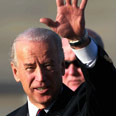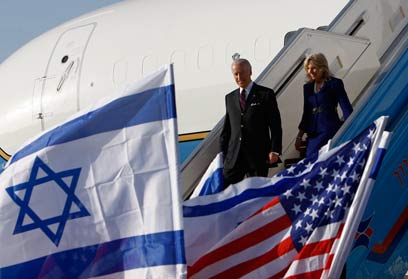
Will Biden bridge gaps between Israel, Palestinians?
Senior PA official says Palestinians feel American willingness to pressure Israel is limited. Six of Netanyahu's seven senior ministers believe current Palestinian leadership is incapable of meeting Jewish state's demands. US vice president set to try to overcome mistrust between sides
Prime Minister Benjamin Netanyahu seeks short indirect talks which will lead to direct negotiations within weeks. Palestinian President Mahmoud Abbas demands a discussion on the essence of the conflict between the people as part of the American-brokered indirect talks.
US special envoy George Mitchell's announcement Monday on the parties' agreement to launch the indirect talks was minor and laconic for a reason. Neither the United States, nor Israel or the Palestinians, believe there is a reason to celebrate. Biden is also avoiding a festive declaration on the negotiations' resumption, 17 months after they were halted during the Olmert government's term.
There was no sense of optimism in the Palestinian Authority following Abbas' meeting with Mitchell on Monday and ahead of Biden's visit. A senior PA official told Ynet that the Palestinians feel the American willingness to pressure Israel to significantly change its policy, and particularly its conduct on the ground, is limited.

Biden arrives in Israel. Palestinians not optimistic (Photo: Reuters)
What is the cause of the dispute? Israel wants direct talks within weeks. Defense Minister Ehud Barak has even told the Palestinians, "Enter the room with Netanyahu and check him out. You may be surprised."
'Obama administration less involved'
According to a Palestinian source, it appears that the Americans mainly want both sides to talk, and then deal with what and how much. "It was just another meeting with Mitchell," the source said, "while between one meeting to another the facts on the ground are only getting worse and there are more settlements and more outposts and more housing units in the settlements.""The Americans want a dialogue, but we have not seen an American stance saying that they will be deeply involved in the process. I won't be mistaken if I say that the current administration is showing a weak stance in the extent of its involvement, even compared to the Bush administration," a senior Palestinian source told Ynet.
The Palestinians are demanding that the sides will discuss the permanent agreement issues, or at lease the borders issue, as part of the indirect talks as well.
Meanwhile, at least six of the special seven-minister forum – Netanyahu, Minister for Strategic Affairs Moshe Yaalon, Shas Chairman Eli Yishai, Minister Benny Begin, Foreign Minister Avigdor Lieberman and Minister of Intelligence Services Dan Meridor, believe that the current Palestinian leadership incapable of meeting Israel's demands, primarily recognizing it as the Jewish homeland and Jerusalem as its capital.
Yaalon said Monday that the Palestinian Authority's willingness to hold brokered negotiations "does not bode well," since they cannot replace direct negotiations.
Washington, Ynet has learned, is also exploring the possibility of creating a clandestine negotiation channel – possibly one involving Netanyahu and Abbas. The current negotiation channel is lead by Palestinian Prime Minister Salam Fayyad, and focuses mainly on everyday issues.
Should the American proposal be accepted, three channels will be created: The indirect one, Fayyad's one and the clandestine one.
American VP's travels
Biden, who arrived in Israel Monday afternoon, will meet with President Shimon Peres on Tuesday, as well as with Netanyahu and Opposition Chairwoman Tzipi Livni (Kadima). The US vice president is also scheduled to visit Mount Herzl, where he will pay his respects at the gravesites of slain Prime Minister Yitzhak Rabin and the founder of modern Zionism, Theodor Herzl.
On Tuesday night, Biden and his wife Jill will dine with Benjamin and Sara Netanyahu.
Biden's Wednesday schedule will see him meet with the Quartet's Middle East envoy Tony Blair, Fayyad and Abbas, before visiting the West Bank city of Bethlehem.
On Thursday, Biden is expected to speak at a Tel Aviv University conference. He will leave for Jordan on Thursday afternoon for a meeting with King Abdulla, before heading back to Washington on Friday.
Vice President Biden's visit to Cairo was canceled in view of Egyptian President Hosni Mubarak absence from the country. The latter is currently recovering from surgery in Germany.
Ali Waked contributed to this report










